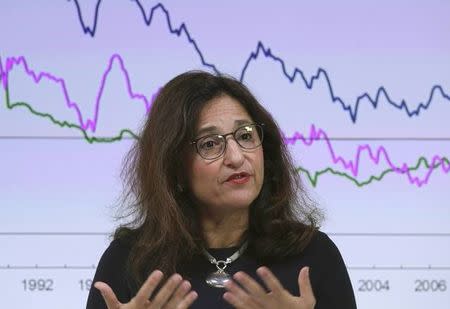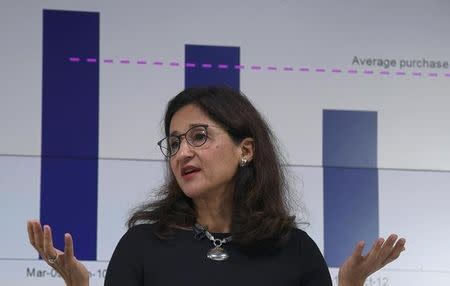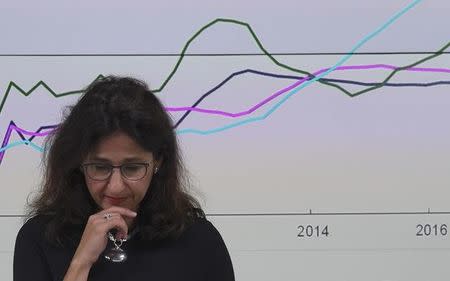More UK stimulus probably needed 'at some point' - BoE's Shafik
By David Milliken and Peter Hobson LONDON (Reuters) - Bank of England Deputy Governor Minouche Shafik played down the likelihood of a further cut in interest rates this year as the British central bank grapples with how aggressively to respond to a slowdown following June's Brexit vote. The BoE said earlier this month that most of its officials still thought more stimulus was likely before the end of 2016 if the economy slows as it expects, although it acknowledged that the immediate hit from the vote to leave European Union had been less severe than the Bank had first feared. But Shafik's comments on Wednesday could moderate expectations of a move at the Bank's next meeting in November. "It seems likely to me that further monetary stimulus will be required at some point in order to help ensure that a slowdown in economic activity doesn't turn into something more pernicious," she said in a speech hosted by Bloomberg in London. "However, the likely timing of that stimulus will depend on the continued evolution of the data over the coming weeks and months," she added. "Thus far, the welcome improvement in the forward-looking indicators suggests that the slowdown may not be as sharp or as sudden as we might have feared." Sterling fell against the dollar after the comments from Shafik, who will leave the BoE in February. Most economists polled by Reuters expect the Bank to cut rates again this year. Earlier, Governor Mark Carney told Scotland's Herald newspaper that in "broad brush" terms, the economy was still slowing as expected in the BoE's August forecasts, which see economic growth dropping to 0.7 percent next year. Shafik said the Bank's response would hinge in part on how much new finance minister Philip Hammond eases back on planned spending cuts in a budget update which will only be announced after the central bank's November rate meeting. "Fiscal policy will be an important part of the story," she said when asked about the chances of a rate move this year. "But if we have data prior to that which signals that stimulus is needed, we will obviously act on that," Shafik added, citing upcoming figures on third-quarter growth and the labour market. Defending the BoE's first rate cut since 2009 last month, Shafik said it was better to act early. "I would much rather be on the front foot and act preemptively rather than be on the back foot and do too little too late," she said. She also cautioned against taking too rosy a view of Britain's prospects after a rebound in some survey measures of business activity: "Forward-looking indicators, particularly things around investment intentions, still look quite worrying, so I don't think the uncertainty is anywhere near over." "In August we expected quite a sharp, short, almost V-shaped shock for the UK economy, and I think the revisions will start to look a bit more U-shaped," she added. (Additional reporting by William Schomberg; Editing by Catherine Evans)

 Yahoo News
Yahoo News 


